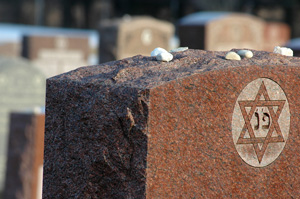Being Jewish
Commentary
Commentary: Reaching on a Rainy Day

We Jews mourn the millions of deaths of those murdered in the Shoah as well as throughout our long history of powerlessness before the state of Israel was established. But what do we make of the death of an individual—Isaac Meyers—a brilliantly gifted, graceful, good, beloved young man of 28 who, on his way to perform a mitzvah, to join a 6:45 A.M. shiva minyan, was struck and killed in the street by a truck? (His yortzeit was recently marked.)
Still stunned after the funeral, some of the mourners took to evaluating the rabbi’s performance: It was good because he said nothing about God’s grand design in snatching away this young man, the light of his parents’ eyes, whose promise of contributing to the world was immeasurable—that would have insulted the sensibilities of everyone present. And good because the rabbi did not imply God was meting out punishment for some unsuspected sin—that would have gone the way of Job’s comforters and rightfully aroused the wrath of the sufferers.
What was bad, in the opinion of some, was that the rabbi read secular poetry that was short of the highest literary standards. Also bad (because it was too “touchy-feely”) was that at a certain point the rabbi asked the mourners to grasp the hands of those on either side of them and hold on tight. Yet sobs broke from me when I clasped the hands of my daughter-in-law on one side and a friend on the other, so visceral was the realization that these bonds could be snapped in a second.
The rabbi at the funeral might have cited the case of the boy recorded in Talmud who, in fulfilling the mitzvah of sparing a mother bird the pain of seeing her eggs taken, got up on a ladder to shoo her away and himself toppled to his death. Such an event sparked endless rabbinic dispute, and one rabbi was so enraged—Elisha ben Abuyah—that he immediately turned apostate. This response seems to have made a deeper talmudic mark on Jewish thought than any of Abuyah’s earlier years as a sage (not to mention his fictional life as the hero of Milton Steinberg’s novel, As a Driven Leaf).
The great thing about talmudic disputes is it that many of them remain unresolved, like our views about life. Is life wonderful, with a few bad things thrown in? Or is life terrible, with a few good things thrown in? Both, of course. Better never to have been born, say some of our ancient sages. Nonsense, say other sages. Life is the greatest gift.
The friend who sat beside me shuddered when the words Barukh dayan emet (Blessed be the true judge) were pronounced. “What,” she might have asked if she had not been so sunk in sorrow, “is this ridiculous spectacle of blessing a God Who does not prevent the death of a wonderful young man on his way to do a good deed?” Bless the God Who takes away your dearest ones? Why do that? On the other hand, what else can you think to do? Imitate the Hasidic rabbi who was so enraged by the suffering of the Jews that he threw stones up at heaven? Naturally the stones rained down on him again, but what breathtaking honesty!
Suppose a loved one suddenly dies, and the mourner cannot bring himself or herself to have anything at all to do with God. No World to Come, no ingathering of souls at the end of days. Not even Mordecai Kaplan’s rationalist description of God as “the power that makes for salvation.” Dust to dust and that’s all.
“Try to live without it.” That’s what Sigmund Freud, the great facer of reality, said about religion. But when his own beloved granddaughter died he declared that his “affectual life” was over. Even for the proudest, most defiant soul, the pity of a young person’s death cries out in some special way. And since God is untouchable except through mind or spirit, we are back to the conundrum of why, when we are filled with suffering, some of us reach out to God with our pain. H










 Facebook
Facebook Instagram
Instagram Twitter
Twitter
Leave a Reply